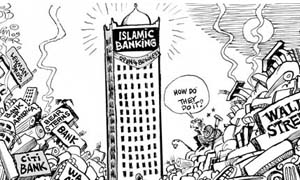By: Aftab Ahmad
Islamic Banks Weather the Storm as Conventional Banks Struggle
At a time when economic observers are worried about the threat of a new global financial crisis and global credit rating agencies have brought down credit ratings of giant financial institutions such as the Bank of America, J.P. Morgan Chase and Morgan Stanley etc, it may be amazing to see that Islamic banks, with their meager resources, are sailing smoothly in troubled waters.
Economic observers had expressed their fears about the possibility of another global financial crisis mainly because of the European debt crisis that has plagued a number of euro-zone economies. European banks that have not yet fully recovered from the global financial crisis of 2008-09 may be required to play an important part in bailing out the debt-ridden economies. It may turn out to be the last straw on the camel’s back, as far as the European financial institutions are concerned. Since the U.S. financial institutions are closely linked with their counterparts in Europe, they may also be in trouble if something happens to the European banks.
Sub-Prime Mortgage: A Disaster
Economists and analysts have been of the view that sub-prime mortgage was the main culprit behind the global financial crisis. What is sub-prime mortgage? In the United States – having a population of nearly 300 million people – nearly every one desires to own a house. A large number of such people can not fulfill their desire without a loan. All such people have a low income and a poor repayment capacity. The conventional banks, in order to boost their business, advanced loans to such persons on higher interest – due to higher risk involved in these loans. The aforesaid loans, according to reports, ran into trillions of dollars. Since the amount was beyond the capacity of the US banks (loans advanced by a bank can not be more than five or six times of its capital), the conventional banks in the US sold a percentage of these loans to the conventional banks in Europe (who willingly purchased papers of such loans because of higher interest attached with the loans).
How Islamic Banks Avoided the Subprime Mortgage Crisis
At the time when these loans were advanced, the interest rate was on the lower side. But, when the time of repayment approached the interest rate had gone up. The situation led to massive loan defaults, which created a panic and eventually paved the way for the GFC. Many reputed banks and financial institutions failed in the United States and Europe, because of loan default on such a massive scale.
Sub-prime mortgage or advancing loans to people with poor repayment capacity was professionally undesirable. It brought disaster to the borrowers, depositors and the banks themselves. The Islamic banks remained unaffected as they had neither advanced such loans nor had purchased any related product from the conventional banks.
Islamic Banks: A Model for Responsible Banking
Hence, Islamic banks, which are new, relatively less experienced and have limited resources as compared to the traditional banks, have come out largely unscathed from the global financial crisis and Great Recession of 2008-09, which is a matter of surprise for the financial circles in the industrialized world. Honesty and moderation have been the hallmark of Islamic banks. Honesty demands that loans should be advanced after fully judging the repayment capacity of the borrower, in order to safeguard the interest of the borrower, depositors and the bank itself. Islamic banks consider it unethical to lend to someone not having repayment capacity at exorbitant interest rates.
Islamic Finance: Responsible Banking
As laid down in the book entitled ‘The Art of Islamic Banking and Finance’ by Yahya Abdur Rahman, Islamic finance is not a money-lending operation as is the case with the conventional banks. Islamic banks are built on assets (and services) based financing. Islamic Banks finance economically viable projects. If the project is not considered viable for the customer, it will not be financed by the Islamic bank. An agreement between the Islamic bank and the customer involves the exchange of assets/properties/businesses or the leasing of these.
Islamic banks do not look at money as something that can be rented for a price (the interest rate). Besides, an Islamic bank does not invest in alcohol-related businesses, gambling and related businesses or in businesses that are not environmentally and socially responsible. It also does not invest in businesses that are unfair to its labor or customers. Islamic banks do not finance speculative activities that are focused on making money out of money or based on speculations in the financial, commodities and real estate markets. For the afore-mentioned reasons, risks facing the Islamic finance are considerably less, as compared to the conventional banks.
Islamic Banks: A Safer and More Sustainable Way to Finance
Islamic banks extend financial assistance for specific purposes such as to locally buy or import a car, purchase or construct a house, etc. The object for which financial assistance is being sought has to be clearly defined and fully identified. This gives an opportunity to the Islamic banks to judge the viability of the project as well as the repayment capability of the borrower. After the bank is fully satisfied about the viability of the project, it enters into an agreement with the borrower. The aforesaid agreement includes all the details about the timing, profit to be charged and mode of payment, etc. The agreement is strictly followed until the project is finalized. Since there is no uncertainty in the business, chances of a default are minimized, thus safeguarding the interest of the borrower, depositors and the bank itself.
Islamic Banks: A Model for Responsible Banking in the Wake of the Global Financial Crisis
Following the global financial crisis and Great Recession, which had resulted in the failure of well-renowned banks and financial institutions in the West, economic observers were surprised to find that Islamic banks were doing business as usual. Financial analysts are still trying to identify the factors behind the strength and resilience of the Islamic banks. The aforesaid scenario has given a new confidence to the Islamic banks and they are trying to expand their business in a cautious and calculated manner.
There is no doubt that conventional banks – considered to be the backbone of the global economy – have been engaged in performing a much more difficult task. They have to meet the financial needs of the various sectors of the national and global economy, in order to ensure economic prosperity. The sphere of activities of the conventional banks is almost unlimited and, therefore, the perils and hazards facing these banks are also innumerable. However, by strictly following the rules and acting with caution and responsibility such risks can be minimized. The conventional banks and all financial institutions should listen to the regulators and refuse to cross the red line. It may be hoped that the lessons learnt from the GFC and global recession would enable all stakeholders to take precautionary steps, so as to avoid the recurrence of such crises in future.
Aftab Ahmad, a retired research economist, writes articles on economic issues regularly.
Got Questions?
We have Answers. Get in touch now.








